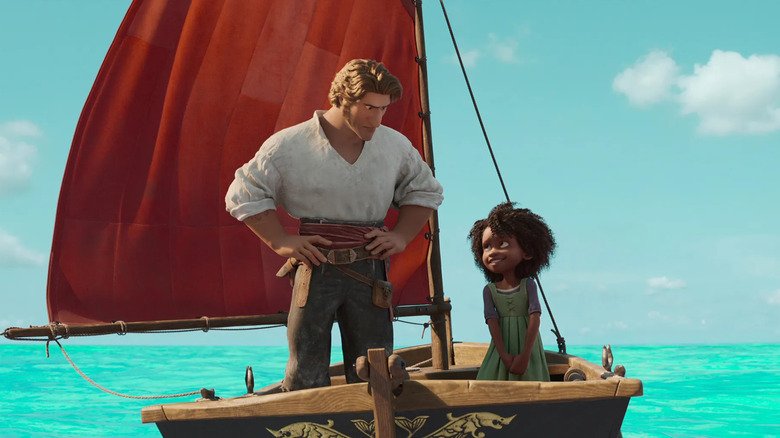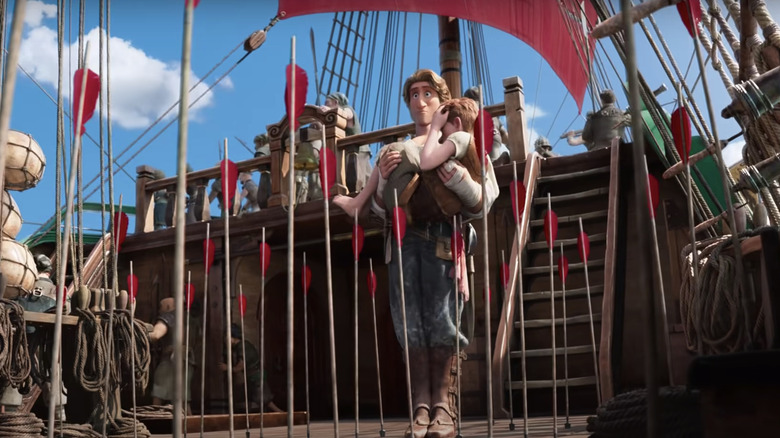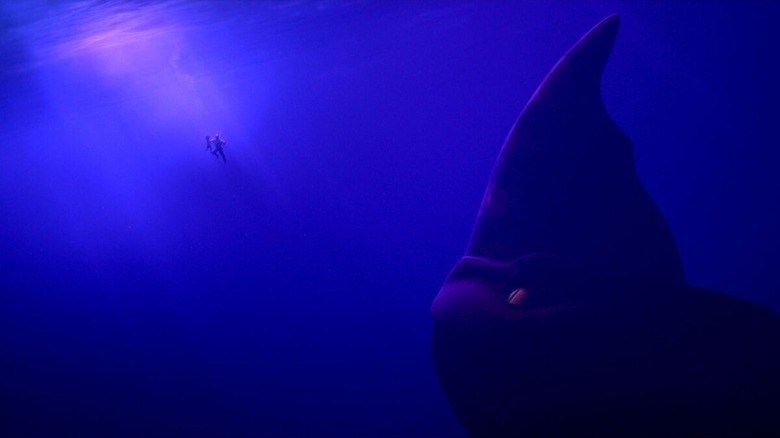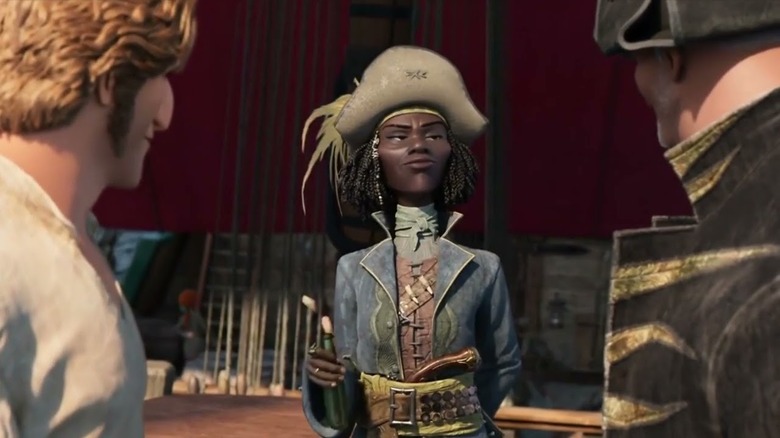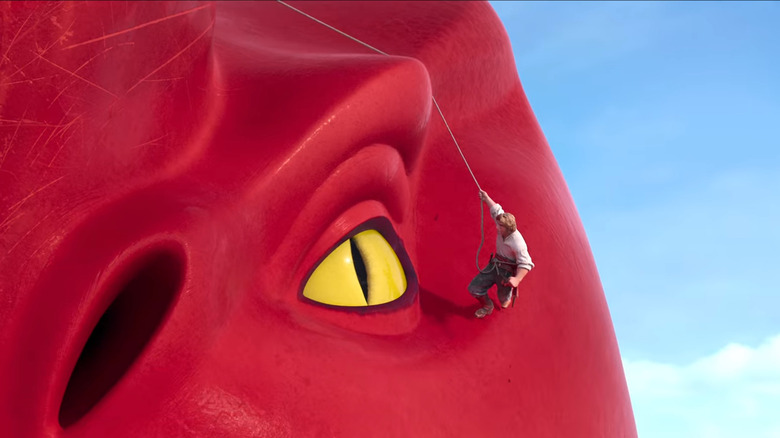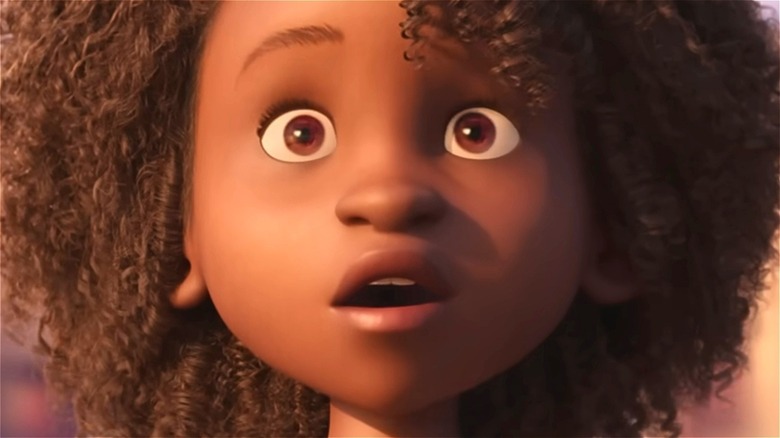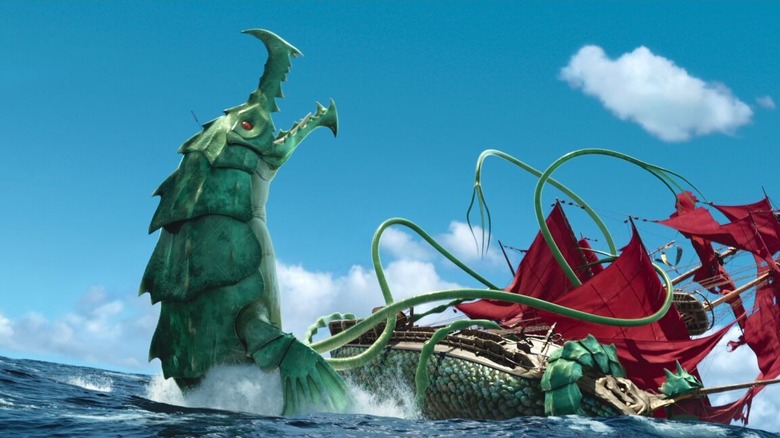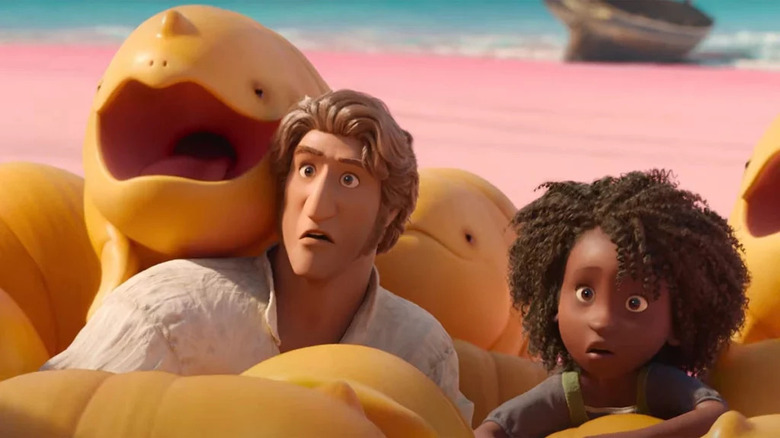The Sea Beast Director On The Increasingly Blurry Line Between Live-Action And Animation [Exclusive Interview]
It's hard to overstate what a phenomenal year 2022 was for animated films. One of the most adventurous and aesthetically diverse years in recent memory, the animated medium truly had something for everyone. There were stories about the dangers of privatizing prisons presented through the lens of punk rock stop-motion and wisecracking demons, coming-of-age tales marrying anime influences with Y2K pop sensibilities, and just about everything else in between. One of my favorites of the year was Chris Williams' anti-imperialist seafaring adventure flick for Netflix, "The Sea Beast."
Boasting the second-largest Top 10 tenure for a Netflix film launched in 2022, reaching the Top 10 Films (English) list in all 93 countries in which Netflix tracks the Top 10, landing on the Top 10 films list for 40 days or more (non-consecutive) in 30 countries, and continuing to remain the biggest Netflix animated feature to date, "The Sea Beast" was still a bit of a shocker when it was announced as one of the nominees for Best Animated Feature for this year's Academy Awards. The film failed to be nominated at the Golden Globes or the Critics Choice Awards, leading many to count the film out of Oscar contention.
Well, folks shouldn't have underestimated director Chris Williams, who previously took home the statue for "Big Hero 6" and earned nominations for both "Bolt" and "Moana" during his tenure at Disney. I recently sat down with Williams to talk about the surprise nomination, the future of animation, and what he has in store for "The Sea Beast 2" and his new, exclusive deal with Netflix.
Note: This interview has been edited for length and clarity.
'We all try to tell ourselves awards don't mean anything'
This year in particular was a really strong year for animation. As the year went on and other projects were coming out, were you surprised that "The Sea Beast" made the cut for the Oscars?
It really was an incredible year for animation. I've been in animation for over 30 years now, and I see it as a continuum when I think about where we started, where the industry was 30 years ago when I went to school, or when I just graduated. It was a time when people really thought of animation as being really just Saturday morning cartoons; really, really synonymous with kids' entertainment. And I think about the way the industry has grown and all these studios that have come into being, and people are taking on more and more sophisticated stories and genres, it seems like the sky's the limit.
This year just feels like an absolute explosion, where certainly in terms of the nominations, I think there were five incredible films that were nominated, but you could go further down the list and nominate five more amazing movies. There are just so many great movies and such a diversity of tones. The storytelling is going in many different directions, and that's really exciting. As the year was unfolding and more and more movies were coming out, I wasn't thinking in terms of like, "Oh, this is my competition." I was just really excited and proud to be working in this industry and seeing all these fantastic films coming out and people not giving in to any imposed limitations of what animation ought to be.
Then in that build-up to the announcement of the nominees, I think there is this game that we all play, where we all try to tell ourselves awards don't mean anything. And there is a truth that when it comes to art, it's not an objective thing. It's entirely subjective. Every audience member's entitled to their own opinion of the movie and their own relationship with the movie, and getting an award should not affect that relationship at all.
So you tell yourself these things, but at the same time, when it comes down to it, we do work really hard on these movies, and I'm really proud of what the crew was able to pull off with "The Sea Beast." This was an especially ambitious film. I mean, you've seen it. It's pretty big. And really, we were pushing the team, and I know that comes with great sacrifice and incredibly hard work. They're very proud of what they were able to do. And so, I was thrilled to see ultimately that their hard work was acknowledged. I'm proud to have made the cut in a year like this year.
On trying to capture the feeling of Fury Road
I'm so glad that you brought up this diversity of animation because I think for a lot of people ... full disclosure, I'm extremely critical of the way that the Academy honors animation, especially after last year and that ridiculous, "Animation's a thing kids love and adults have to endure" speech. I'm pretty sure I set a building on fire with my mind.
Oh, don't get me started. I can go on a rant. I'm bottling up my rant right now.
Animation is a medium and I think it is so evident, especially with just what Netflix released. "The Sea Beast, "Wendell and Wild," "Guillermo del Toro's Pinocchio," "Apollo 10 ½," all of these animated features, and I know there were more, but none of them look like each other.
Yeah.
So I am interested if you could talk about why you chose to make "The Sea Beast" in animation when the technology exists where we can have big live-action monster movies like "Godzilla vs. Kong." Obviously, you're an animator, so that's part of it, but why is it so important that the story of "The Sea Beast" is told in animation and not any other medium?
Actually, you snuck in a really good point there, which is, I work in animation, I love animation, and I'm committed to it. I'm not one of those people that has that itch to venture into live-action. I still feel like I've so much to learn and I feel like if I got to the mountaintop and feel like I've learned everything there was to know about animation, I might move on. But I don't think that's ever going to be the case. I just love it so much. So any story I take on will be an animated movie. So that almost is a component of the answer. I think we may have talked last time about the fact that when I was growing up, my favorite films were big action-adventure stories. And I think I may have mentioned that "King Kong" was ... of course, I love "Star Wars," but King Kong was my favorite film growing up until "Raiders [of the Lost Ark]" came along. "Raiders," that was the big lightning bolt moment for me. And I love movies like "Clash of the Titans" and "Lawrence of Arabia," and these movies where characters venture out into the unknown. And of course, "The Road Warrior" was a huge thing for me. I studied that poster. Before I got to see the movie, I studied that poster. That movie really spoke to me.
So I love that genre and I love well-choreographed action scenes. To me, that's pure cinema. And just as an aside, I was just recently thinking about "Fury Road." I got to see that movie, a little sneak peek I saw the night before it came out. So I was there with some pretty hardcore fans in the theater. And of course, the movie was amazing and we were all loving it. I assume you've seen it.
Oh, yeah. I also saw it in black and white because [mockingly pushes up glasses] "cinema."
I had a feeling. So there's that really long action scene where they had that long chase through the desert, and then they're confronted by that big sandstorm and the cars are being whipped up in the storm. And it's a long and insane and intense action scene. And then it suddenly ends and there's that shot of the sand and it's quiet. I remember being in the audience and having this experience where we all started laughing when we saw just the stillness of that shot.
And I was thinking that we're not laughing at the movie. You know what I mean? This was a good feeling. And I was like, "What are we experiencing right now? What is this laughter? What is the source of that?" And it occurred to me that we are all coming back into our bodies. We had forgotten that we were sitting in a room with a bunch of other strangers watching a thing. We were so caught up in the intensity of the scene. And I thought, "Isn't that an incredible thing that movies can do, that they can make us forget ourselves, forget we are physical things, and just get completely lost in it?"
That's something that I've always loved, is the power of cinema and the power of a really well-put-together action scene to just teleport an audience. So I've always been seeking that. I think I've gone a really long way around answering your question.
On the future of animation
But I love this, because this is how my brain works.
So, why animation? Well, I think that's a question that is valid, and it used to be something that we really would ask ourselves even before taking step one. I was at Disney for 25 years and we'd say, "Is this an animated movie, or would this be better as a live-action movie?" We had to answer the question, "Yes, this lends itself to animation," before we'd even take that first step. But man, it is getting really blurry, that line, because as animation ventures out into different genres and different tones, it's getting harder to get your head around what animation ought to be.
At the same time, live-action is using so much animation in ways that are invisible oftentimes to the point where you're like, "Well, what is 'Avatar' again? What am I looking at here?" Or any Marvel movie uses so much animation. And then you've got a movie like "Marcel the Shell" and you're like, "Well, what is this?" At a certain point, maybe the question is getting less important, because I think some of the filmmakers are asking really valid questions of, "If you don't want to categorize this as animation, how would you categorize us? What are we?" And to me, that's exciting to think that it's just opening up new frontiers.
So, I didn't get too caught up in that question from the beginning. We knew that we wanted to tell a story that had these big monsters, where the scale was going to be a big part of the experience of watching the movie, that we're going to have very large things and very small beings, and they were going to fight, but they were also going to have relationships and connect. So that started to govern a little bit of decisions about production design and the look and the feel of the world.
We knew that we didn't want it to be too broad, even though I love "Cloudy with a Chance of Meatballs," and I love really comedic, fun movies that have a more broad look and acting style. We knew that wasn't going to be right for us because we really wanted to feel the scale and feel the stakes and feel the peril and communicate to the audience, "This is a world where the danger is real and people can die in this world." So that had a bearing on the look, but it never deterred me from thinking that this could work in animation.
'Let's go big'
The first movie that I actually remember seeing in theaters is the first "Toy Story" movie. And the specific shot that exploded my brain is Woody talking to the army men, and it's that shot of half of his face covering the whole screen because the Army men are so small. I just remember sitting there being blown away as a five-year-old. And I think "The Sea Beast" really captures that sensation for me again, where suddenly I'm very aware of how small I am in the world, even as an adult. What's impressive is that you managed to do that in a movie that I watched at home. Did your process in making this have to adjust knowing the majority of your audience is watching it in their living room?
Very early on, one of the early decisions you have to make is how big is everything. So you have meetings where you line up ships and boats and people and monsters and try to get a sense of what's the size relationship between these things.
And I remember they had different sizes for Red from smallest to biggest. And I went clear down the wall and I was like, "I want the biggest. Let's see if we can pull this off." And everyone thought, "That's pretty big." But I was like, "Well, let's try it. Let's really push it, and if we can't pull it off, if it breaks, we'll have to shrink her down a little bit, but let's go big." And I suppose "let's go big" was almost like the mantra of the movie. Everything is big. Hopefully, emotionally not. Hopefully, emotionally, it's more intimate and more observed.
It is.
Thank you! But as far as the scale of the action and the set pieces and everything, we wanted to go really big. But the way in which people were going to be watching it, I didn't really think about that too much. It didn't enter the equation. It was true that when I left Disney, because I had been at Disney for 25 years, that was one of the things that I had to make peace with, is the idea that we were no longer making a movie that was going to be seen primarily on the big screen. But we knew there were going to be opportunities theatrically and we had an amazing screening in France for a thousand-seat theater.
Just this last weekend, I was back home in Canada and we screened it to a couple of full houses, one in Toronto and one in my hometown of Kitchener-Waterloo. It was great to have that experience and it really is cool, projected big like that. But the truth is, even if you're working on a movie that is destined for a theatrical release, ultimately its true home, the way that most people are going to see it, is at home, a home theater. So I wasn't too bummed out about it, and I did take some solace in knowing that people's systems are getting better, the screens are getting bigger, and the sound is getting better. That buoyed me a little bit. But no, beyond that, it didn't really enter into it.
'Movies can go out and can find an audience'
The big thing from this year is also that "The Sea Beast" is the most-watched animated feature on Netflix. How do you feel when you learned that metric of more people have watched your movie than anything else?
We do make these movies to be seen. We want to find an audience. So on one hand, when you hear, I think it was after a month, 165 million hours, the number is overwhelming and you can't get your head around it. But what it translates to is actual people, an actual audience, watching the movie. And that is important.
So, it is really gratifying to know that people have found it and are enjoying it. And certainly, Netflix is very cagey about the numbers, but the sense I get is that [...] it continues to find an audience and it continues to roll along and do quite well on the service.
There are probably also some people out there who just watch "The Sea Beast" a hundred times because streaming has given them that accessibility. How do you feel about those people in the world, where "The Sea Beast" is their movie?
I've met some of them and it feels good to know that you've made something that really speaks to someone. And we are in a very different world, as far as the way that people watch things and as far as their relationship with the movies that we make. There are things to lament about the evolution as far as movies and the way that they're watched and the way that's evolved, but there are upsides, too.
I think one of the things that's nice is we are not subject to the tyranny of the opening weekend, where there's all this build-up and studios spend a fortune just to make sure that opening weekend is big because that's everything. Over the years that I've been working in animation, more and more of that became critical. Movies weren't just put out and then were able to find an audience over a period of time. It was all or nothing. It had to be that opening weekend and that told the story.
You could pretty much predict the box office entirely based on that one weekend. And if you happen to come out on a weekend where there are storms or you're up against James Cameron or something, well, you can get lost and the movie can disappear. There's something cool about the fact that movies now can go out and can find an audience. There's something to be said for that. And the fact that we have found this fanbase that seems to really connect in a deep way with the movie, that's great. I'm honored.
On the future of The Sea Beast
Looking towards the future, you've got your deal with Netflix and "The Sea Beast" story is continuing. What are you taking from the experience of making this first movie with you into making the second one? Are you looking bigger? Anything you would like to say that is not going to get you in trouble speaking about a sequel?
Well, I've never worked on a sequel, so I've been thinking a lot about sequels that work and sequels that didn't. There's always that temptation to just make it bigger and bigger and bigger, but then quickly that can just feel like a lot, and you can lose what was great about the first one, why the first one was successful, which is usually because people connect with the characters and the relationships. So it has to still be a story that is based on our characters.
One of the things about the first one as we were working on it is it's obviously a really big movie and it's about a lot of things, but I would say again and again to the crew, this movie is more about Jacob and Maisie's relationship than it's about anything else. And I think that would probably continue to be true.
One of the things I thought about — because I didn't actually think that we were ever going to make a sequel. We were making the first one. To me, this wasn't the beginning of a franchise or a setup for something else, which I think can, sometimes, that can be a problem if the audience feels like, "Oh, this is just a movie-perpetuating machine." You know what I mean?
Continuing to connect The Sea Beast to our world
Oh, god. Yeah.
It should be a movie in its own right. So I never thought in those terms and things felt so resolved. You see Jacob and Maisie on the dock there and everything's so nice and the hunters have stopped hunting and it's all over. But I kept thinking about that image of Jacob and Maisie on the dock and the fact that they're this new family. And that image, it doesn't tell the entire truth of what it is to be a family.
A family's much more complicated than that. And I was thinking about the fact that Jacob has always defined himself as a protector. He's someone who wants to keep people safe. He would risk his own life to keep others safe because of a trauma that he suffered as a child. He doesn't want anyone else to experience that. And I thought, "Well, he's probably going to be a pretty protective parent." And then I think about the fact that Maisie is this young woman and she's –
She's a firecracker.
She has a strong will, to say the least. Suddenly, I thought, "Boy, this could be interesting to explore the dynamics of this new family." So that became interesting to me. Then I thought about the world, because one of the things that I emphasize a lot when we were putting together the first one is that it had to feel believable. It had to feel true. I started wondering, "Would every single hunter in the world be so willing to lay down their lance and give up their source of income and their identity and their source of pride and their sense of history? Would they be so willing to give it up?" And maybe not all of them would be.
When I started thinking about that, I thought there was perhaps an opportunity to explore some thematic ideas that are really relevant to our world today, which is always so important. So those ideas really got me fired up and got me excited about it. So I am actively working on a sequel. I'm also working on another original thing, a fantasy story that is also early days, but I'm excited about that as well. So I find myself very, very busy, but not complaining.
"The Sea Beast" is currently streaming on Netflix.
